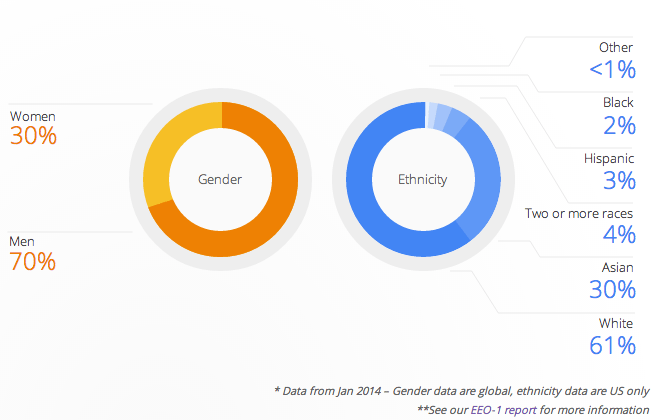Google: We’re “not where we want to be when it comes to diversity”
On Wednesday Google shared its organisation’s diversity numbers revealing the company’s makeup for the first time. Google have openly admitted they have been wrong to withhold the numbers in the past saying, “We’ve always been reluctant to publish numbers about the diversity of our workforce at Google. We now realize we were wrong, and that it’s time to be candid about the issues.”
Source: Google Blog
Figures reveal that 70 percent of Google’s global workforce is male. 61 percent of employees are white, with Asian being the second-largest ethnic group at 30 percent. Hispanic and Black weighed in at 3 percent and 2 percent, respectively.
Many have strongly criticised Google for their poor figures but openly acknowledging the issue was a good first. In fact, in order to improve diversity, Google has invested $40 million since 2010 in programs for educating women and girls in computer science. The company has also worked with historically black colleges and universities on their computer science coursework.
Google has also been busy creating ‘Employee Resources Groups’ aimed at building and supporting communities. Below are a few of the groups:
The Black Googler Network (BGN) – An employee resource group of Googlers dedicated to attracting, recruiting, developing, and retaining top black talent at Google. Members of BGN sponsor many events throughout the year, including month-long activities for Black History Month, mentoring, and volunteer opportunities.
The Gayglers – are an employee resource group comprised of LGBT Googlers and their allies. The group not only lead the way in celebrating Pride around the world, but also inform programs and policies, so that Google remains a workplace that works for everyone.
The Indus Googler Network (IGN) – aimed at the South Asian community, they hold activities include community service, outreach programs, and cultural celebrations such as Diwali and Holi.
The question remains whether there is a problem in the first place because shouldn’t hiring the most talented people for open positions be the only criteria for employment, rather forcing numbers for the sake having a diverse organisation.
The above data is from the Google US offices, we wonder if Google will be so open in revealing figures for their UK office.
Do leave your views and comments below to join the conversation.
